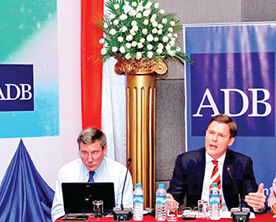Myanmar’s positive political developments and structural reform programs will help foster economic growth and investment, according to a new Asian Development Bank (ADB) report.
ADB forecasts Myanmar’s economic growth to recover to 8.4% in fiscal year 2016 (ending 31 March 2017). The country’s economic growth eased to an estimated 7.2% last fiscal year due to widespread flooding and landslides.
Though economic reforms implemented since 2011 have had positive outcomes, Myanmar’s new government will face the challenges of advancing these economic reforms, addressing infrastructure and labor shortages, and making progress towards peace and social cohesion,” said Winfried Wicklein, ADB Country Director in Myanmar. “Moreover, intensified efforts are needed to connect and develop rural areas to improve access to markets and services, and to generate opportunities and jobs.” Foreign direct investment is expected to get a lift from the successful political transition following national elections in November 2015, with investment flowing into newly established special economic zones and rapidly expanding transport, telecommunications, and energy sectors.
Inflation will moderate as agricultural recovery from the floods brings down food prices. It is estimated to remain high at 9.5% in FY2016, before declining to 8.5% in FY2017.
Risks to Myanmar’s economic outlook include thin external and fiscal buffers, the capacity of the government to maintain reform momentum, ethnic and sectarian tensions and vulnerability to bad weather. ADB emphasizes that Myanmar’s transport infrastructure, after decades of under-investment, provides poor access to markets and services, perpetuates poverty and regional inequality and hampers business development.
ADB estimates that $60 billion is needed through 2030 to upgrade transport systems to a standard seen in other countries at a similar stage of development. “This means increasing transport sector investments to the equivalent of 3% to 4% of gross domestic product from little more than 1% in recent years,” said Peter Brimble, ADB Deputy Country Director in Myanmar. “Private sector resources will need to be mobilized given the immense funding requirements.”
ADB, based in Manila, is dedicated to reducing poverty in Asia and the Pacific through inclusive economic growth, environmentally sustainable growth, and regional integration. Established in 1966, it is owned by 67 members – 48 from the region.










